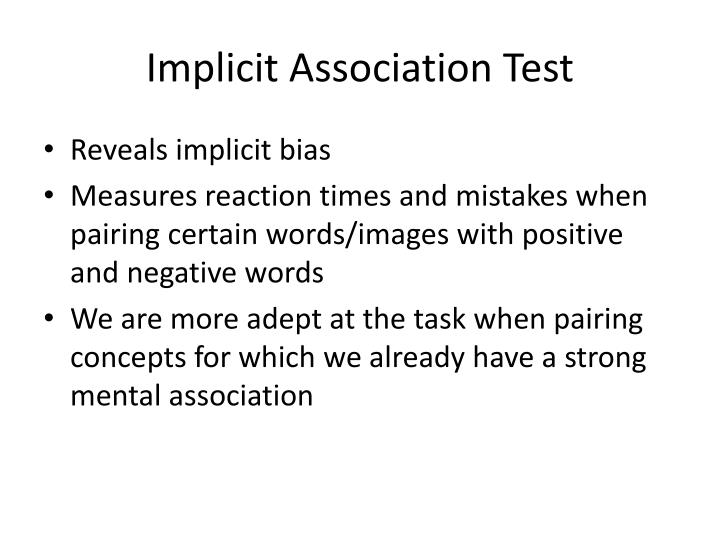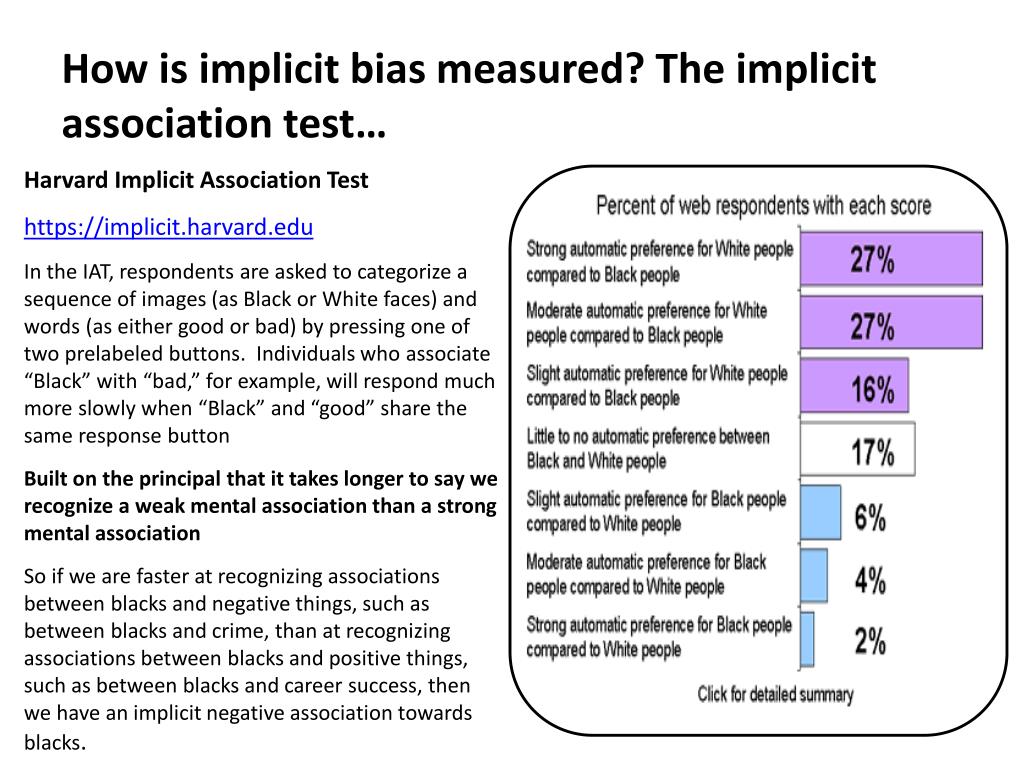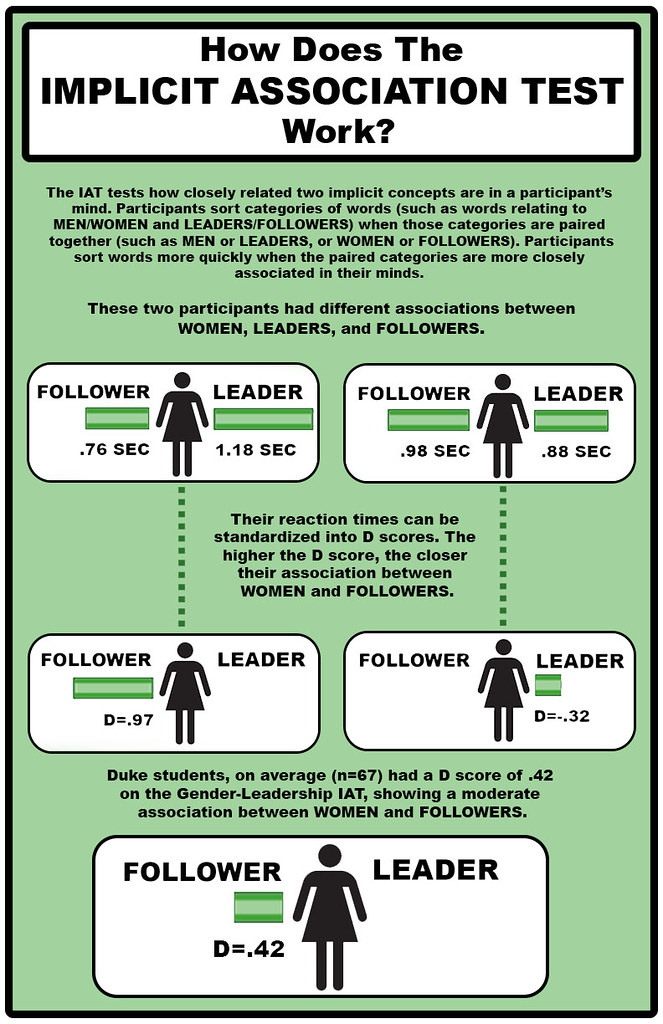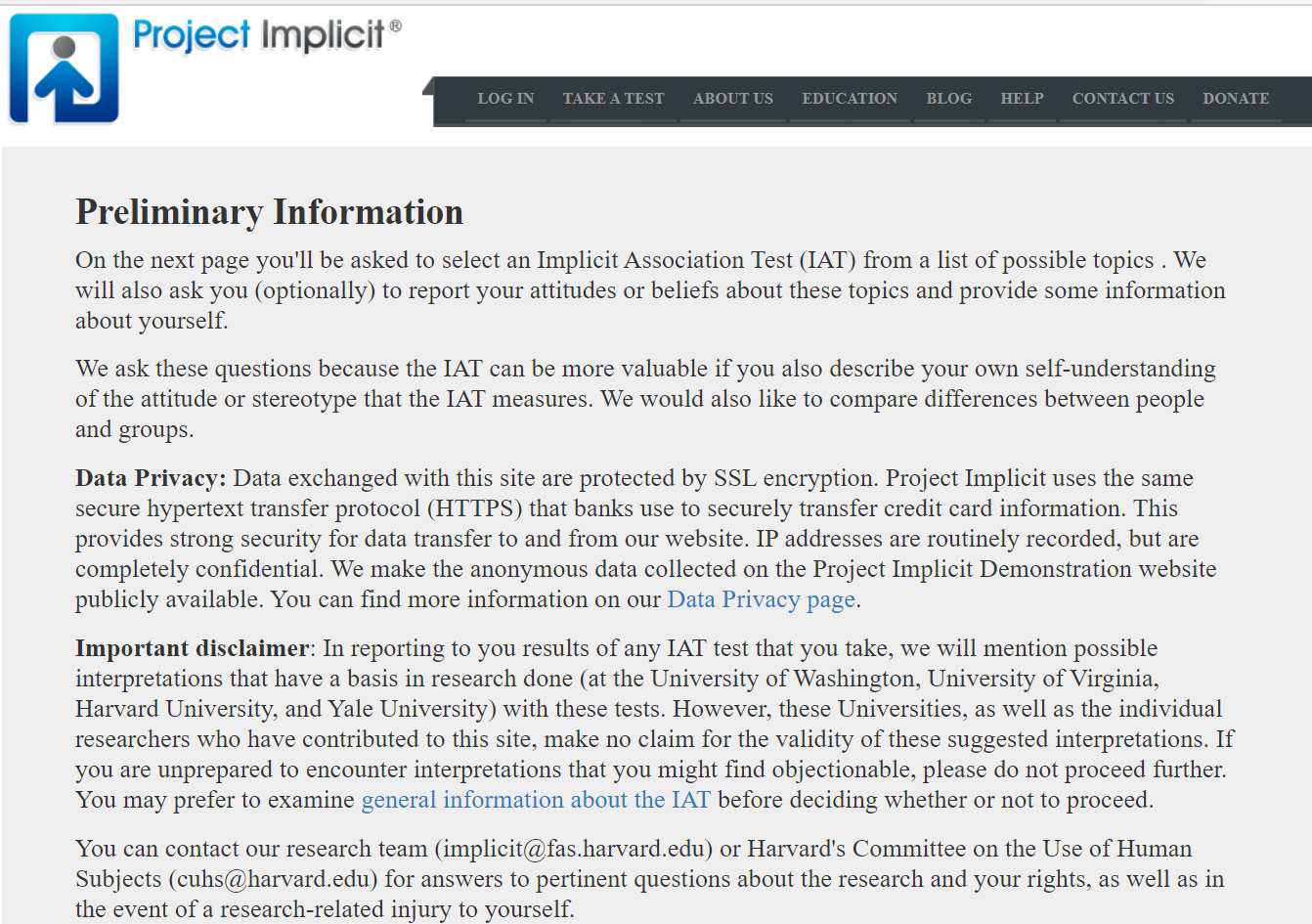Implicit Bias Test Printable - Web these quiz questions will assess what you know about implicit bias in the workplace. The test measures response time to the computer images as a proxy for implicit bias. The iat measures the strength of associations between concepts (e.g., black people, old people, or gay people) and evaluations (e.g., good or bad) or characteristics (e.g., athletic, smart, or clumsy). Web project implicit is the product of a team of scientists whose research produced new ways of understanding attitudes, stereotypes, and other hidden biases that influence perception, judgment, and action. This test was first published in 1998 by project implicit, and has since been continuously updated and enhanced. This is an online test of quick responses to a series of words and pictures; Web on the next page you'll be asked to select an implicit association test (iat) from a list of possible topics. Web test yourself for hidden bias. Topics include a definition of implicit bias and what it's based on. Web the implicit association test (iat) is commonly used to measure implicit bias in individuals.
Bias Worksheet Worksheets For Kindergarten
We will also ask you (optionally) to report your attitudes or beliefs about these topics and provide some information about yourself. Web the implicit association test (iat) measures the strength of associations between concepts and evaluations or stereotypes to reveal an individual’s hidden or subconscious biases. Psychologists at harvard, the university of virginia and the university of washington created project.
Pin on Fandom's & Stuff
We will also ask you (optionally) to report your attitudes or beliefs about these topics and provide some information about yourself. Web project implicit is the product of a team of scientists whose research produced new ways of understanding attitudes, stereotypes, and other hidden biases that influence perception, judgment, and action. Selecting the circle nearest a right or left statement.
PPT Implicit Bias PowerPoint Presentation ID3548121
The test measures response time to the computer images as a proxy for implicit bias. The iat measures the strength of associations between concepts (e.g., black people, old people, or gay people) and evaluations (e.g., good or bad) or characteristics (e.g., athletic, smart, or clumsy). We will also ask you (optionally) to report your attitudes or beliefs about these topics.
implicit bias worksheet
Web the implicit association test (iat) measures the strength of associations between concepts and evaluations or stereotypes to reveal an individual’s hidden or subconscious biases. Selecting the circle in the middle means both statements may be representative of you equally. The iat measures the strength of associations between concepts (e.g., black people, old people, or gay people) and evaluations (e.g.,.
This kids' worksheet is a perfect example of how implicit bias gets
This is an online test of quick responses to a series of words and pictures; Selecting the circle in the middle means both statements may be representative of you equally. Web the implicit association test (iat) measures the strength of associations between concepts and evaluations or stereotypes to reveal an individual’s hidden or subconscious biases. The iat measures the strength.
Implicit Bias DNCConsulting
Psychologists at harvard, the university of virginia and the university of washington created project implicit to develop hidden bias tests—called implicit association tests, or iats, in the academic world—to measure unconscious bias. The test measures response time to the computer images as a proxy for implicit bias. Web the implicit association test (iat) is commonly used to measure implicit bias.
Ls1 Iat Wholesale Prices, Save 61 jlcatj.gob.mx
Web test yourself for hidden bias. Web project implicit is the product of a team of scientists whose research produced new ways of understanding attitudes, stereotypes, and other hidden biases that influence perception, judgment, and action. The test measures response time to the computer images as a proxy for implicit bias. The iat measures the strength of associations between concepts.
Implicit Bias Test Printable
This is an online test of quick responses to a series of words and pictures; Web implicit bias test this is an online test of quick responses to a series of words and pictures; Web these quiz questions will assess what you know about implicit bias in the workplace. We will also ask you (optionally) to report your attitudes or.
Rise Of The Bias Busters How Unconscious Bias Became Silicon Valley's
Selecting the circle in the middle means both statements may be representative of you equally. The test measures response time to the computer images as a proxy for implicit bias. Web on the next page you'll be asked to select an implicit association test (iat) from a list of possible topics. Web implicit bias test this is an online test.
Implicit Bias Test Printable
This is an online test of quick responses to a series of words and pictures; Topics include a definition of implicit bias and what it's based on. Selecting the circle nearest a right or left statement means that statement strongly represents you. The iat measures the strength of associations between concepts (e.g., black people, old people, or gay people) and.
Topics include a definition of implicit bias and what it's based on. The test measures response time to the computer images as a proxy for implicit bias. Web implicit bias refers to the attitudes or stereotypes that affect our understanding, actions, and decisions in an unconscious manner as opposed to explicit bias, which are attitudes held at conscious level blair, 2002; Psychologists at harvard, the university of virginia and the university of washington created project implicit to develop hidden bias tests—called implicit association tests, or iats, in the academic world—to measure unconscious bias. Web project implicit is the product of a team of scientists whose research produced new ways of understanding attitudes, stereotypes, and other hidden biases that influence perception, judgment, and action. This is an online test of quick responses to a series of words and pictures; Selecting the circle in the middle means both statements may be representative of you equally. Selecting the circle nearest a right or left statement means that statement strongly represents you. The iat measures the strength of associations between concepts (e.g., black people, old people, or gay people) and evaluations (e.g., good or bad) or characteristics (e.g., athletic, smart, or clumsy). Web the implicit association test (iat) is commonly used to measure implicit bias in individuals. Web implicit bias test this is an online test of quick responses to a series of words and pictures; Web on the next page you'll be asked to select an implicit association test (iat) from a list of possible topics. Web the implicit association test (iat) measures the strength of associations between concepts and evaluations or stereotypes to reveal an individual’s hidden or subconscious biases. We will also ask you (optionally) to report your attitudes or beliefs about these topics and provide some information about yourself. This test was first published in 1998 by project implicit, and has since been continuously updated and enhanced. Our researchers and collaborators translate that academic research into practical applications for addressing diversity, improving decision. The test measures response time to the computer images as a proxy for implicit bias. Web these quiz questions will assess what you know about implicit bias in the workplace. Web test yourself for hidden bias.
Web The Implicit Association Test (Iat) Is Commonly Used To Measure Implicit Bias In Individuals.
Web implicit bias test this is an online test of quick responses to a series of words and pictures; We will also ask you (optionally) to report your attitudes or beliefs about these topics and provide some information about yourself. Topics include a definition of implicit bias and what it's based on. This is an online test of quick responses to a series of words and pictures;
This Test Was First Published In 1998 By Project Implicit, And Has Since Been Continuously Updated And Enhanced.
Web test yourself for hidden bias. Psychologists at harvard, the university of virginia and the university of washington created project implicit to develop hidden bias tests—called implicit association tests, or iats, in the academic world—to measure unconscious bias. Selecting the circle nearest a right or left statement means that statement strongly represents you. Web on the next page you'll be asked to select an implicit association test (iat) from a list of possible topics.
Our Researchers And Collaborators Translate That Academic Research Into Practical Applications For Addressing Diversity, Improving Decision.
Selecting the circle in the middle means both statements may be representative of you equally. Web project implicit is the product of a team of scientists whose research produced new ways of understanding attitudes, stereotypes, and other hidden biases that influence perception, judgment, and action. Web the implicit association test (iat) measures the strength of associations between concepts and evaluations or stereotypes to reveal an individual’s hidden or subconscious biases. Web these quiz questions will assess what you know about implicit bias in the workplace.
The Test Measures Response Time To The Computer Images As A Proxy For Implicit Bias.
The test measures response time to the computer images as a proxy for implicit bias. Web implicit bias refers to the attitudes or stereotypes that affect our understanding, actions, and decisions in an unconscious manner as opposed to explicit bias, which are attitudes held at conscious level blair, 2002; The iat measures the strength of associations between concepts (e.g., black people, old people, or gay people) and evaluations (e.g., good or bad) or characteristics (e.g., athletic, smart, or clumsy).










